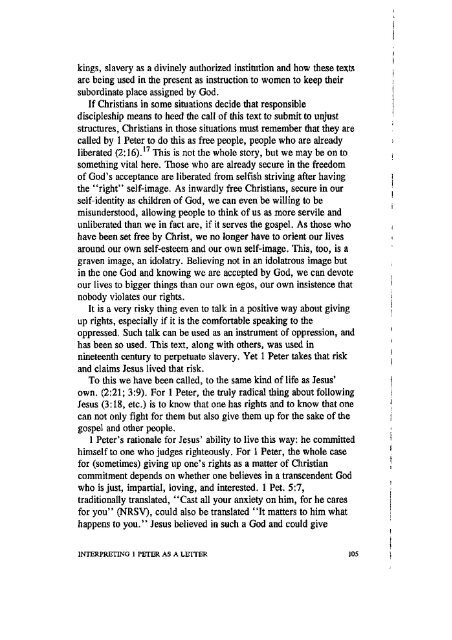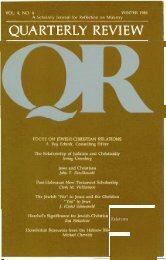TJieodore W. Jennings, Jr. The Meaning of ... - Quarterly Review
TJieodore W. Jennings, Jr. The Meaning of ... - Quarterly Review
TJieodore W. Jennings, Jr. The Meaning of ... - Quarterly Review
Create successful ePaper yourself
Turn your PDF publications into a flip-book with our unique Google optimized e-Paper software.
kings, slavery as a divinely authorized institution and how these texts<br />
are being used in the present as instruction to women to keep their<br />
subordinate place assigned by God.<br />
If Christians in some situations decide that responsible<br />
discipleship means to heed the call <strong>of</strong> this text to submit to unjust<br />
structures, Christians in those situations must remember that they are<br />
called by 1 Peter to do this as free people, people who are already<br />
liberated (2:16). 17<br />
This is not the whole story, but we may be on to<br />
something vital here. Those who are already secure in the freedom<br />
<strong>of</strong> God's acceptance are liberated from selfish striving after having<br />
the "right" self-image. As inwardly free Christians, secure in our<br />
self-identity as children <strong>of</strong> God, we can even be willing to be<br />
misunderstood, allowing people to think <strong>of</strong> us as more servile and<br />
unliberated than we in fact are, if it serves the gospel. As those who<br />
have been set free by Christ, we no longer have to orient our lives<br />
around our own self-esteem and our own self-image. This, too, is a<br />
graven image, an idolatry. Believing not in an idolatrous image but<br />
in the one God and knowing we are accepted by God, we can devote<br />
our lives to bigger things than our own egos, our own insistence that<br />
nobody violates our rights.<br />
It is a very risky thing even to talk in a positive way about giving<br />
up rights, especially if it is the comfortable speaking to the<br />
oppressed. Such talk can be used as an instrument <strong>of</strong> oppression, and<br />
has been so used. This text, along with others, was used in<br />
nineteenth century to perpetuate slavery. Yet 1 Peter takes that risk<br />
and claims Jesus lived that risk.<br />
To this we have been called, to the same kind <strong>of</strong> life as Jesus'<br />
own. (2:21; 3:9). For 1 Peter, the truly radical thing about following<br />
Jesus (3:18, etc.) is to know that one has rights and to know that one<br />
can not only fight for them but also give them up for the sake <strong>of</strong> the<br />
gospel and other people.<br />
1 Peter's rationale for Jesus' ability to live this way: he committed<br />
himself to one who judges righteously. For 1 Peter, die whole case<br />
for (sometimes) giving up one's rights as a matter <strong>of</strong> Christian<br />
commitment depends on whether one believes in a transcendent God<br />
who is just, impartial, loving, and interested. 1 Pet. 5:7,<br />
traditionally translated, "Cast all your anxiety on him, for he cares<br />
for you" (NRSV), could also be translated "It matters to him what<br />
happens to you." Jesus believed in such a God and could give<br />
INTERPRETING 1 PETER AS A LETTER 105












